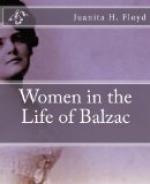“May I write without imprudence, before receiving a counter-order? Your last letter counseled me not to write again to Dresden. However, I take up my pen on the invitation contained in your letter of the 8th. Since you, as well as your child, are absolutely determined to see your Lirette again, there is but one way for it, viz., to come to Paris.”
He planned how she could secure a passport for Frankfort and the Rhine and meet him at Mayence, where he would have a passport for his sister and his niece so that they could come to Paris to remain from March 15 until May 15. Once in Paris, in a small suite of rooms furnished by him, they could visit Lirette at the convent, take drives, frequent the theatres, shop at a great advantage, and keep everything in the greatest secrecy. He continues:
“Dear Countess, the uncertainty of your arrival at Frankfort has weighed heavily on me, for how can I begin to work, whilst awaiting a letter, which may cause me to set out immediately? I have not written a line of the Paysans. From a material point of view, all this has been fatal to me. Not even your penetrating intelligence can comprehend this, as you know nothing of Parisian economy nor the difficulties in the life of a man who is trying to live on six thousand francs a year.”
Thus was his time wasted; and when he dared express gently and lovingly the feelings which were overpowering him, his beautiful Chatelaine was offended, and rebuked him for his impatience. Desperate and almost frantic, he writes her:
“Dresden and you dizzy me; I do not know what is to be done. There is nothing more fatal than the indecision in which you have kept me for three months. If I had departed the first of January to return February 28, I should be more advanced (in work) and I would have had two good months at St. Petersburg. Dear sovereign star, how do you expect me to be able to conceive two ideas, to write two sentences, with my heart and head agitated as they have been since last November; it is enough to drive a man mad! I have drenched myself with coffee to no avail, I have only increased the nervous trouble of my eyes; . . . I am between two despairs, that of not seeing you, of not having seen you, and the financial and literary chagrin, the chagrin of self-respect. Oh! Charles II was right in saying: ‘But She? . . .’ in all matters which his ministers submitted to him.”
On receipt of a letter from her April 18, 1845, saying, “I desire much to see you,” he rushed off at once to Dresden, forgetful of all else. In July, Madame Hanska and her daughter accompanied him home, traveling incognito as Balzac’s sister and his niece, just as he had planned. Anna is said to have taken the name of Eugenie, perhaps in remembrance of Balzac’s heroine, Eugenie Grandet. After stopping at various places on the way, they spent a few weeks at Paris. Balzac had prepared a little house in Passy near him for his friends, and he took much pleasure in showing them his treasures and Paris. Their identity was not discovered, and in August he accompanied them as far as Brussels on their return to Dresden. There they met Count George Mniszech, the fiance of Anna, who had been with them most of the time.




